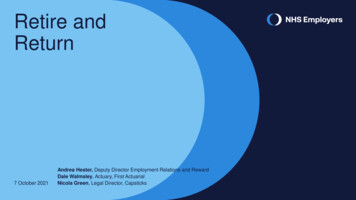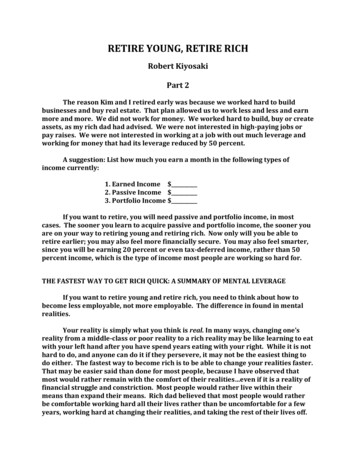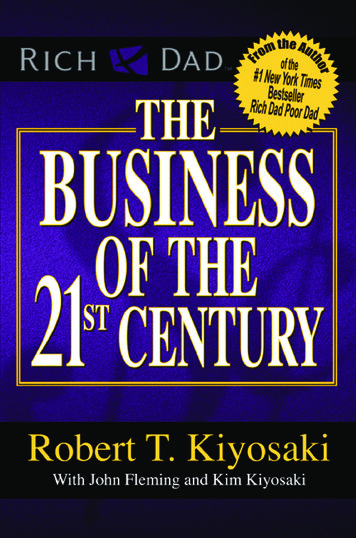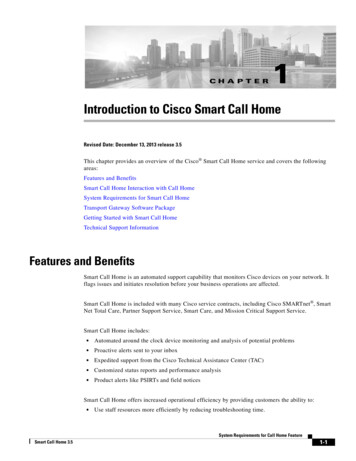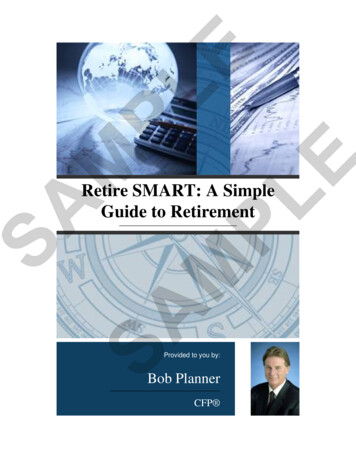
Transcription
Retire SMART: A SimpleGuide to RetirementProvided to you by:Bob PlannerCFP
Retire SMART: A SimpleGuide to RetirementWritten by Financial EducatorsProvided to you byBob PlannerCFP DE 06870832021 Update
IntroductionWhile many Americans have spent years planning for theirretirements, a great many of them have made a basic discovery oncethey reach that plateau. Namely, that there are some issues thatsimple math and time will not necessarily resolve. If you are nearretirement or have retired, listed below are several common mistakesthat occur in the arena of financial planning for retirement that you canplan now to avoid. The remainder of this booklet will explain potentialways to deal with these issues.Common Retirement Financial MistakesUnderestimating your life expectancy: A generation ago, it wasprobably safe to assume that men would live to approximately age 70,and women to perhaps 75. But advances in medical science havepushed those ages up at least fifteen to twenty years. Realisticfinancial planning for seniors should probably assume that at leastone spouse will live to age 90 or beyond.1 To make sure your money1For a married couple where both have reached age 65, there is a 39% chance thatat least one will live to age -mortality-calculator/ visited 12/16/214
lasts, you may need to annuitize your assets to create a sufficientincome (explained later).Are you thinking that you’ll be able to retire when you want? Infinancial planning for retirement, many workers plan on working intotheir 70s—until illness, disability, or mere fatigue forces them toreconsider. If you plan on working past the normal retirement age, donot count on the extra money earned to pay for essential expenses.Sound financial planning for senior years would have you save asufficient nest egg by age 65 in case health reasons prohibit you fromworking longer.Neglecting to adequately factor in health care costs: Failure to dothis can be disastrous, especially if long-term care treatment isneeded. And don’t count on the government to pick up the bill for youeither. Make certain that your health coverage is adequate and thatyou have a plan to cover other elder care needs. This is the #1 errorin financial planning for seniors, as it’s estimated that half of thebankruptcy in the US is caused by health failures and theaccompanying costs.2Settling for low returns: Don’t let your fear of risking principal leaveyou with a guarantee of running out of money prematurely. Sensibleasset allocation may lower the risks of investing, including the chancethat your money will not grow enough to meet your needs. Althoughasset allocation may reduce risk, it does not insure a profit orguarantee against loss. But if you insist on keeping money in threemonth CDs and T-bills as many seniors do, your earnings will be solow that you increase the likelihood of running out of money. Soundfinancial planning for seniors means that your investment horizonshould match your actuarial life expectancy. In simple English, if youare age 70 with an expected life expectancy of 16 more years, yourinvestment portfolio should be constructed to serve you for 16 years,not 6 months.2National Bankruptcy Forum "Medical debt is a big problem in the United States. Foryears, it's been the No. 1 reason people file for l-debt-statistics/ visited 12/16/215
Failure to monitor or control your distribution rate: Your financialadvisor should be able to run some basic calculations based on thesize and allocation of your portfolio that show a safe rate ofwithdrawal. A general rule of thumb is somewhere between three andfive percent per year, depending on your portfolio’s allocation betweenequity and fixed income investments. We have seen some financialplanning disasters when people spend beyond this level.Refusing to get a fresh perspective: No matter how effective youradvisor or plan is, getting a second opinion on it will never hurt.Different advisors have different areas of expertise, such as taxes ormutual funds. Therefore, having a different set of eyes review yoursituation may provide insights that you would otherwise miss.The following articles provide guidance on ways to potentially address these issues.Generating Retirement IncomeFinancial planning prior to retirement is focused on assetaccumulation, tax minimization, and maintaining a budget that allowsfor maximum savings. Retirement financial planning, however, isfocused on these different objectives: maintaining an adequateincome without salary or wages, maximizing pension and socialsecurity, having adequate health and long-term care protection andminimizing financial risk.You can’t know for sure if you have adequate resources until youdo some number work. If you find this nitty gritty retirement financialplanning stretching your patience, then hire a retirement planner.Here are the steps:6
1. Estimate your retirement spending needs: housing (includingnew furniture and updating), food (including dining out), insurance(including long-term care), personal expenses, vacations,entertainment, utilities, transportation, taxes (income and property),etc. Add to this list anything that applies to your desired lifestyle.Add up the total and now you know how much you need, which isStep 1 of your retirement financial planning. Let’s say this figure is 50,000.2. Next, you want to see how much you have and create aretirement income plan. Add your sources of retirement incomeincluding social security, pensions, and annuities. An examplefollows but please note that the illustration is hypothetical and notindicative of the performance of any particular product. From anysavings such as IRAs and 401k and other investment accounts,assume a withdrawal rate of 5%. So if you have a nest egg of 500,000, assume that you can take 5% annually and the nest eggshould be fairly safe at least for 30 years.3Note that just to maintain your standard of living, you need toalways leave some earnings behind in your nest egg to account forinflation. An item that costs you 10,000 this year will cost you 10,300 next year. Even if you don’t care about having anything leftand want to spend more, you don’t have much wiggle room. Forexample, if your nest egg were to earn a constant 6% annually andyou withdraw 8% annually of your beginning balance, you exhaustthe fund in 24 years (online calculator from CalcXMLhttps://bit.ly/2XDhPJE). You could easily outlive your money andthat’s why it’s important to stick to the retirement financial planning5% rule3. Compare your total sources of income from Step 2 and yourexpenses from Step 1. If you have excess income, congratulations- you’ve done good retirement planning.3Trinity Study: Sustainable Withdrawal Rates From Your Retirement Portfolio; PhilipL. Cooley, Carl M. Hubbard and Daniel T. Walz 1998, updated 2018https://bit.ly/2MY0Yiz, visited 12/16/217
4. If you have a deficiency, you have a few options: Adjust your lifestyle and spend less. Maintain your lifestyle, but move to a less expensive area ofthe country or out of the country. Work part time in retirement. Retire later - by working a couple more years, a 500,000 nestegg growing at 6% accumulates an additional 61,000 (6% x 500,000 compounded for 2 years 61,000 TexasInstruments BA 54 or any financial calculator). That additionalprincipal provides an additional 3,050 of spending moneyannually (assuming 5% annual retirement return x 61,000).Note that later in life, say at age 75, you may switch your strategyand decide to "annuitize" some of your assets - i.e. spend them downto zero and give yourself more income today. One way to annuitizeyour assets is with a life annuity, as payments will last as long as youdo. (Get details from your financial or insurance advisor).Retirement Income Sources4Many retirees lack controlover 50% or more of theirretirement income. For example,if a retiree has income of 50,000annually, and 30,000 comesfrom social security and employerpension, the retiree controls lessthan half of his retirement income– making those sourcessomewhat useless to discuss. Solet’s focus on the sources ofretirement income you can control and how to boost them.4The tax issues and risk issues of the investment options mentioned in this sectionare as follows: bank certificate deposits are FDIC insured to 250,000 and interest istaxed as ordinary income. Annuities are backed by the claims paying ability of theissuing insurance company. The portion of the payment that IRS considers interest.8
Let’s work up the ladder of rates that you can get from guaranteedretirement income sources.Bank Certificates of Deposit: Terms from three months to fiveyears. Generally, the longer the term, the higher the rate. Interest isavailable monthly for a guaranteed retirement income or cancompound. A one year CD is .85% at the highest paying bank as of12/16/21. 5 After inflation and taxes, you actually lose money.Therefore, holding large sums for long periods in CDs is financiallyfoolish.Annuities: Guaranteed by the issuing insurance company, safestcompanies rated AAA by Standard and Poor’s. Large companies likePrudential and New York Life actually lent money to the USGovernment during the depression. Use deferred annuities (paying2.90%) 6 if you don’t need the income or immediate annuities if youneed the income. A 70-year-old male can get 560/month for life on a 100,000 deposit (equal to 6.7% annual cash on cash return) 7.Payments end at death and nothing is left. Some immediate annuitiesprovide a feature for payments to heirs in case of early death, but themonthly payments will be less.The above paragraph describes an immediate annuity—a one-timepayment of a premium to an insurance company. In return, youreceive payments for a specified term or for life. Under the life option,payments cease when you die. Note that immediate annuities mayhave fees or commutation charges and generally cannot besurrendered for value. Payments you receive are subject to IRS rules4 (cont.). is taxed as ordinary income. Municipal bonds will fluctuate in value, areguaranteed by the issuing municipality or issuing agency and interest is free fromfederal tax and may also be free from state tax if you are a resident of the state wherethe bond is issued. Corporate bonds and preferred shares are issued by publiccompanies, will fluctuate in value and carry risk of loss. Interest on corporate bonds istaxed as ordinary income; dividends on preferred shares are generally taxed at the15% rate. Mention of these securities does not constitute an offer to buy or sell.5Bankrate.com 1 year CD for Pentagon Federal Credit Union6Oxford Life Multi-Select 8 https://bit.ly/31rAxJI 12/16/217www.immediateannuities.com an average of 16 insurance companies 12/16/219
which consider each payment part principal and part interest. Thepayments are guaranteed by and subject to the claims-paying abilityof the issuing insurance company.Federally Backed Mortgage Notes: Although you’ve heard a lot inthe news about Fannie Mae and Freddie Mac, the US governmenthas backed their securities 100% – giving them AAA safety. Thesame goes for Ginnie Mae Securities. Your money is loaned formortgages, and the government agency guarantees your investment– at 15 years, rates approximate 2.35%.8 Actual term is uncertain aspeople can pay off their mortgages early. Income is monthly.Corporate Bonds and Preferred Shares: These can be a reliablesource of guaranteed retirement income from corporations. Again, forsafety, buy those that are highly rated, at least A. Bonds pay interesttwice annually, and preferred shares pay dividends quarterly.Municipal Bonds: A source of guaranteed retirement income fromcities, states or municipal districts. Buy those rated AAA for bestsecurity. Income is paid twice annually. Or, for another idea ofguaranteed retirement income, build a ladder of zero-couponmunicipal bonds. Interest and principal is paid all at once at maturity.Example: male age 52 buys 75,000 face value of municipal bonds tomature starting at age 62, and for each year thereafter for 20 years, toprovide 75,000 of tax free income annually. The cost today of eachbond averages less than 65 cents per dollar of face value – yields upto 2.5% tax free currently.98Representative example 12/16/21 Federal National Mortgage Corporation, 2.35%yield, hfa-mba.aspx9Representative example: as of 12/16/21 OCEANSIDE CALIF UNI SCH DIST CAPAPPREC-REF due 8/1/45 yield 2.35%, price 53.01https://www.municipalbonds.com/screener/10
Dividend income from stocks and mutual funds can be animportant and significant source of retirement income, however, it isnot assured as corporations may change their common stockdividends at any time. If you own mutual funds, there are fundsoriented toward paying a consistent dividend income and those thatdo not. Are you in the right funds? Similarly, there are value stocksthat pay dividends averaging 4.1% 10, while many growth stocks payno dividends at all. By your selection of stocks and funds, you controlthis important source of retirement income.Protecting Your AssetsWhile everyone needs car,homeowners and healthinsurance, there are specifictypes of insurance that are verypertinent to seniors or retirees.These senior insurances aredetailed below, and the failure tohave any of these protectionscould be the difference between acomfortable retirement and yearsof heartache.Life Insurance: While thecommon reason to get life insurance is to replace income for thefamily should we die and our income stops, seniors or retirees are notdependent on their labor for income. Therefore, it seems that seniorlife insurance would be superfluous. But life insurance for seniors hasother uses to solve other problems, such as providing liquidity atdeath for a surviving spouse, ease of estate settlement and division,creating a pool of money for special needs – to create an estate andto pay estate taxes.10Dogs of the Dow https://www.dogsofthedow.com/doggish.htm, average yield of top10 yielding stocks of the Dow Jones Industrial Average 12/16/21.11
Health Insurance: No one should go without health insurance.However, senior health insurance is different in that private insuranceis required in combination with government coverage. A typical seniorhealth insurance program would include Medicare to cover 80% ofhealth care costs and private insurance, or Medigap coverage, tocover the other 20%.Funeral Insurance (burial insurance): While it’s true that a funeralcan easily cost 20,000, most people of any means have the financialresources to cover their funeral, so special insurance may not benecessary. However, it is an excellent idea to have a funeral programstructured so that your heirs don’t need to take on this burden at theirgreatest time of grief. It could make sense to combine your funeralarrangements with funeral insurance as a package that relieves heirsof all financial and funeral planning concerns.Long-term Care Insurance: Typically, in our working years, we havedisability insurance to provide income in the event of our disability.Since we are no longer working in our retirement, it’s wise to obtainlong-term care insurance in the event of disability due to age.Long-term care insurance policies provide income to cover the extraexpenses for the help you need for shopping, cleaning, cooking,bathing, dressing, driving and getting round.As you can see, there are many types of senior insurance issuesthat apply specifically to retirees past 65 years of age.12
Other Retirement IssuesRetirement is not just about the size of your nest egg. There areseveral considerations for a comfortable retirement experience inaddition to a financial retirement plan. These considerations extend towhere you live, housing options, and healthcare quality and choices.Most importantly, what activities will you do in retirement to staymentally and physically fit? Here’s a short list of considerations to addto your retirement checklist.Healthcare Needs for a Healthy Retirement Experience1. Do you have insurance that will cover catastrophes?2. Do you live in proximity to medical specialists you may need toconsult?3. Is your HMO or health plan available where you plan to have asecond home or move?4. If you plan to travel outside of the US, does your health plancover you?5. Do you have long-term care insurance? (Don’t make themistake of thinking that Medicare pays.)13
Retirement and Moving Your Residence1. What are the tax rates in the new community—property taxes,state income taxes, state sales tax – and do they taxretirement income and social security income differently thanother income?2. If you reach an age where you cannot drive, will the publictransit take you to your favorite places?3. Is the climate satisfactory in all months? How about allergymonths (e.g. spring time)?4. Is there an adequate selection of senior housing complexes,assisted living facilities and nursing homes and what is thecost?5. Is there an active population of retirees in the new area andpeople you can befriend?Retirement income structure1. Does one spouse have a pension that ends upon death? Yourretirement consultant can show you how to possibly replacethat income.2. If both spouses are eligible for Social Security income, theremay be ways to maximize the benefit—check with a retirementplanner.Estate planningEstate planning is not just for the rich. It is for anyone that caresabout their heirs. In fact, most aspects of estate planning basics havelittle to do with money.Estate planning basics do address the eventual and economicaldistribution of your possessions and authority but more importantly,how you take care of your loved ones. Many of you may think youdon’t have an estate plan – but you do! Federal and state rules willdetermine who gets what and how much, and how you will be treatedif you become very ill. If not prepared with basic estate planningknowledge, it costs money and heartache.14
Putting your estate in order can be complex. It depends on howmany assets you have, where they are, your family structure –children, divorced and previous children, state laws – and more. But,no matter how small or large your estate is, here are the four tools ofbasic estate planning:1. Will or trust2. Durable power of attorney3. Living will4. Health care proxy (medical durable power of attorney)Your will shows your wishes for disposition of your assets andnames a guardian for minors. In it, state how property in your nameshould be distributed, name an executor to be in charge of carryingout your wishes, and provide for payments of costs incurred in settlingyour estate. And for your minor children, designate a guardian andname a trustee to protect their inheritances. One estate planningbasic is to use a trust in place of a will because it maintains privacyand avoids court involvement in the settlement of your estate.Additionally, trusts typically contain conservatorship provisions. If youshould lose your mental capacity in your old age, do you want yourfamily to be in court about your care, or would you rather have awritten plan in advance? Estate planning basics call for planningahead.Your Durable Power of Attorney gives someone else permissionto manage your affairs if you become disabled or incapacitated. Withit, as soon as you become incapacitated, your designated person, i.e.your spouse, adult child or anyone you trust, can manage (pay bills,make decisions) your affairs or you can restrict that power to onlyparticular assets or accounts. Don’t wait! You can’t create a durablepower of attorney once you’ve become incompetent.Your Living Will – expresses your wishes to your doctors whenthey must consider use of life-sustaining measures. This is yourdeclaration on what life-sustaining medical treatments you will (or willnot) allow if you become incapacitated. For example, you may requestthat artificial nourishment be (or not be) withheld if you become15
terminally ill. You may recall the Mary Schiavo case on this issuewhich became a national news story only because these estateplanning basics were ignored.A Medical Durable Power of Attorney (or health care proxy) is acrucial and basic estate planning tool that designates someone tomake health care decisions on your behalf in the event you no longercan. It’s a document that gives a person you designate permission tomake health care decisions on your behalf if you are unable to do soin the future, and perhaps, consistent with your living will. Talk to theperson before appointing him, and be sure he or she understands andis comfortable with your wishes, and is strong enough to carry themout despite some family members’ objections.Seek professional help in planning your estate – consistent withyour state laws and your particular circumstances. No one will tell youabout the estate planning basics. Be proactive and ASK yourretirement advisors what you need to do to get your estate in order.SummaryThese are only a few ideas to help you better protect your assetsand make the most of what you worked hard to accumulate.Financial and retirement planning can have an impact on yourestate, even if your estate is of modest size. Find an advisor who is knowledgeable in senior matters. Find an advisor who will answer your questions, as well asanswer questions that you have not thought to ask. Find an advisor who will point out opportunities and cautionyou about risks, and one who is knowledgeable about thespecial needs of retired individuals.With the sound advice of experience and a conservativeretirement plan, you and your family can get the most out of yourassets.16
AboutBob PlannerBob Planner has been assisting seniors for 12 years toprotect their assets and invest wisely. In fact, he hasassisted over 1000 retirees to safely invest over 500,000,000 into secure investments. He has advisedretirees of IBM, AT&T, Chevron, and General Electric.First Name Last Name is a junior partner with MidAmerica Financial Services and an expert in helpingretirees preserve their assets and increase their income.Bob graduated from Colgate University in 1972 after someundergraduate work at the University of Chicago. After initialcoursework at George Mason University, he received a master'sdegree from Western Illinois University in 1996. He also holds amaster's degree from Christian Bible College in Rocky Mount, NorthCarolina. To avoid the most frequent ways that many retirees ruintheir finances, do not miss one of Charlotte's best speakers. Call forseats today.17
AboutABC Company NameBob Planner Investment Advisory LLC seeks to preserve clientsassets and our style would be properly considered "conservative."Most of our clients are age 60 and most are retired. Our approachhas been successful in preserving client account values even duringvolatile times.· Estate Planning - Includes assistance with livingtrusts and elimination of estate taxes.· Wealth Management - preserve your capital.· Financial Planning - help you maximize all of yourfinancial opportunities· Insurance Services - assure that your risks in life areinsured for so that an unforeseen event does notdestroy your savings and financial plan.18
Phone today with questions or to see if we can help you.There is no charge for an initial meeting.Bob PlannerCFP 8888932998ABC Company Nametest@seniorleads.com1212 Jones RdYour Town, CA 94555 2015 Financial EducatorsFirst Published 11/01/10This booklet is protected by copyright laws. It may not be reproduced or distributedwithout express written permission of the author by anyone other than those with anactive subscription to SeniorLeads or advisorbooklets.com.Published by Financial Educators
Annuities: Guaranteed by the issuing insurance company, safest companies rated AAA by Standard and Poor's. Large companies like Prudential and New York Life actually lent money to the US Government during the depression. Use deferred annuities (paying 2.90%) 6 if you don't need the income or immediate annuities if you need the income.
